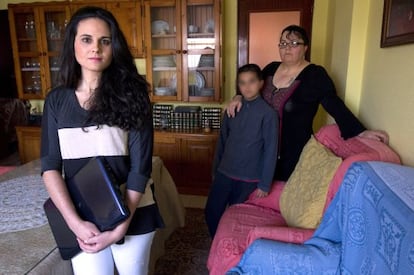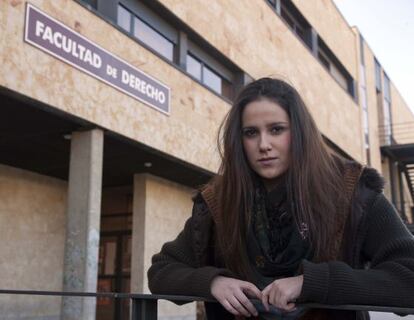Grant delays hit poorer students
Changes to procedures and tougher criteria mean that funding is often not disbursed until the second half of most university courses is underway

Halfway through the academic year, the majority of the over 385,000 Spanish university students eligible for a grant are still waiting to receive their funding. In Catalonia, no funding has been made available at all. "It makes no sense to pay grants late; doing so defeats the object of the exercise," says Lorena Ortiz, a 23-year-old studying art at Granada University.
The Education Ministry blames regional governments for the delay, saying it has followed the same time frames as last year in paying out a total of around 1.6 billion euros in grants. "We pay the money out as soon as we get the application forms in," says a ministry spokesman. But university administration departments tell a different story, describing this year as "chaotic" due to the fact that more students applied for funding and there have been changes to the rules governing disbursement by the government.
Meanwhile, students such as María Soto, a 22-year-old in her second year of study at the University of Extremadura to become a nursery teacher, has not even been informed whether she will receive a grant this year. According to Soto, her request was marked as preferential by her university, given that her father has been jobless for three-and-a-half years without unemployment benefit, and her mother and 20-year-old brother are also without work.
In Catalonia, no funding for students has been made available at all
She gets by, she explains, with the help of other family members, as well as relying on a food bank to eat. "Sometimes I go to university on the bus; other times I walk." Her landlord has agreed to wait for the rent on her student room in Badajoz until she finally receives her grant. "The university authorities have allowed us to eat for free in the canteen, and they also give us rolls so we can have something in the evening," she explains. María received her annual grant of just over 6,000 euros for the 2011/2012 academic year by December of 2011.
Over the last two years, grants have been paid increasingly late. Until now, most students received their money over the course of their first term. Salamanca University says that the only delays were in cases where the authorities disputed a claim, or when a student had failed to fill in the forms properly.
It is hard to estimate how many students are still waiting to receive their grants. It is also worth pointing out that some grants are little more than a couple of hundred euros, either for tuition fees or scholastic material, while others, up to a maximum of 6,000 euros, are meant to cover a student's living costs as well. There are at least 31,000 grants yet to be paid in Catalonia alone. In other regions, some students have begun to receive grants, but most universities say that this year's delays are significantly longer than in previous years.

For example, the University of Burgos says that all of its students have now received their grants, while Zaragoza, Elche, Salamanca, Extremadura and many others all say that payments will not be completed until after March. Ezequiel Valentín, head of the students' union at the University of Extremadura, says around half of the 13,000 applications there have yet to be processed. The university authorities refused to talk to EL PAÍS about the delays.
Victoria Vivancos is vice rector at the University of Valencia, and a students' representative to the Conference of Rectors, CRUE, a body set up in 1994 that represents the heads of Spain's universities. She says government cuts mean that universities have reduced administrative staff, and that the Education Ministry has changed many of the criteria required for filling in forms, which has created confusion and delays. For example, the number of copies of applicants' families' identity cards required has changed. "It's been a disaster - complete chaos," says Vivancos. "We warned the ministry in a letter in October that the changes would mean delays for many students, and that is exactly what has happened."
CRUE is also campaigning against plans to cut funding for higher education and research. In December all but one of the heads of 50 public universities took the unusual step of staging simultaneous readings around the country of a joint declaration of protest against plans to cut 18 percent from funding for universities and 7.21 percent from funding for research and development from the 2013 central government budget.
Until now, most students got their money during their first term
Taken together with the financial difficulties of regional governments, this reduction "is bringing our university system to the brink of economic asphyxiation and will cause irreparable harm," says Vivancos.
The cuts are currently working their way through the Spanish parliament. If, as seems likely, they are approved, this will represent a cut in research funding for the fourth year running.
All in all, 2012 has been a tough year for Spain's universities. Last April, the government announced a freeze on recruitment and promotions for permanent teaching and administrative staff. Budget restrictions have also meant that many institutions have been unable to replace staff who have retired, or renew temporary contracts.
Funding cuts mean that universities have reduced their administrative staff
By December, Spanish universities were having to function with 3,000 fewer lecturers than a year before, according to Adelaida de la Calle, president of CRUE, and rector of Málaga University.
At the beginning of October, many Spanish students found themselves having to pay substantially more for their education as increases in tuition fees - ranging from 33 percent in the Valencia region to up to 66.7 percent in Catalonia - came into effect.
At the end of the month, 39 of the country's top researchers sent a joint letter to Prime Minister Mariano Rajoy asking him to use a strategic vision when carrying out the cuts to avoid reversing the advances made by Spanish research in recent years.

The Education Ministry says it sent out liaison personnel to help university administration departments, and denies there have been any delays or problems as a result of the cuts and changes to application criteria. But administrative staff at several universities consulted by EL PAÍS back up Vivancos. La Laguna University, in the Canary Islands, says in a letter that it has only just completed the application process for grants: "There have been delays because the Education Ministry has eliminated the presence of support staff... in some cases we have had to repeat the same online application forms up to 14 times because of the infinite number of technical problems that have occurred."
In Catalonia - where so far no student grants have been disbursed, and where applicants have not even been notified that their request is being processed or whether they have been accepted or rejected - the procedure is different. The regional government signs a yearly agreement with the Education Ministry in Madrid whereby it is given a lump sum by the central government, and it manages the applications directly. The regional government says that it received the details of the agreement only last week, and that it will now sign the agreement and send it back to the Education Ministry and then begin sending out funding. The ministry insists the time frames are in line with those of previous years. But last year's agreement was signed in December, and in 2011 it was signed in November, according to the government's monthly Official State Bulletin.
Paula Salvatella is in the fourth year of a journalism degree at the Autònoma University of Barcelona. Last year she did not receive her grant until mid-March. "Mine was very late, although some other students received their grants by December," she says. The previous year, Catalonia delayed grant payments because of problems at the regional government's treasury department, but the policy then was to pay grants in installments, whereas now they are paid in a single amount. The Catalan regional government says all grants will be paid by the end of February.
Many institutions have been unable to replace staff who have retired
"These delays are nothing new. If they approve your application in January, you may not get your money until May or June, almost at the end of the course. This has been going on for at least four years, since I began university. Most students just get on with it," says Oriol Martín, a member of the AJEC students' union. He adds that grants are never paid automatically once an application is approved, and that further delays are due to the payments being processed by the Finance Ministry.
Alejandra Díaz, a 19-year-old whose parents are farmers, is in her first year of studying criminology at the University of Salamanca, and is still waiting to hear whether her grant application has been accepted. She says she spends around 300 euros a month on her living costs. Her parents, on a low income, are further limited in the help they can provide as her 23-year-old sister, unable to find a job after finishing her studies, has now returned to live at home.
Art student Lorena Ortiz says her monthly living costs amount to 350 euros, including drawing materials. She has been told that her grant has been approved, and will eventually receive 5,400 euros, but doesn't know when.
The delays are due to the ministry having eliminated support staff"
Abraham Galera still doesn't know whether he will receive a grant, but even if he does, he says it won't be a large amount. He's in his third year at Barcelona University studying journalism, and says he received 800 euros in his first year, and then 150 in his second. He explains he is facing severe financial problems. He lives 80 kilometers from his university, and spends around 500 euros a month on transport. For the moment, his parents, who run a small restaurant, are funding his studies and living costs. He earns a few euros each month coaching a local youth soccer team. Tuition costs have risen more than 60 percent in Catalonia on last year. "The tuition fees in my first year were 888 euros; this year they are 2,200 euros," he says.
The Education Ministry's decision to toughen the criteria for grant applicants by requiring them to achieve better results means some students will endure a long wait before being told that they are not going to be given funding: students must now pass 90 percent of their courses, up from 80 percent. Desirée Pérez Montes is studying with the UNED distance learning university, and still hasn't been told whether her grant is coming. If she is turned down, she can apply to a social fund, but must do so by April 30. "At this rate, I don't know if I will be in time if I am turned down for a grant," she says.
As well as the social funds set up by many universities to deal with sudden changes to a student's situation, such as a sharp decline in the earnings of their parents, grants are also available from regional governments, but these are only available for students who have been turned down for a grant by the Education Ministry.
The tuition fees in my first year were 888 euros; this year they are 2,200 euros"
It's not just students who are being inconvenienced by the delays in approving grant applications; universities are unable to plan because they do not know how many students they will have, as many drop out halfway through courses, unable to pay their fees. Lorena Ortiz says that two of her colleagues dropped out of postgraduate studies once they were told they would not get funding. "We have suggested to universities that they allow their students to pay their fees in eight installments," says Vivancos.
Tu suscripción se está usando en otro dispositivo
¿Quieres añadir otro usuario a tu suscripción?
Si continúas leyendo en este dispositivo, no se podrá leer en el otro.
FlechaTu suscripción se está usando en otro dispositivo y solo puedes acceder a EL PAÍS desde un dispositivo a la vez.
Si quieres compartir tu cuenta, cambia tu suscripción a la modalidad Premium, así podrás añadir otro usuario. Cada uno accederá con su propia cuenta de email, lo que os permitirá personalizar vuestra experiencia en EL PAÍS.
¿Tienes una suscripción de empresa? Accede aquí para contratar más cuentas.
En el caso de no saber quién está usando tu cuenta, te recomendamos cambiar tu contraseña aquí.
Si decides continuar compartiendo tu cuenta, este mensaje se mostrará en tu dispositivo y en el de la otra persona que está usando tu cuenta de forma indefinida, afectando a tu experiencia de lectura. Puedes consultar aquí los términos y condiciones de la suscripción digital.








































